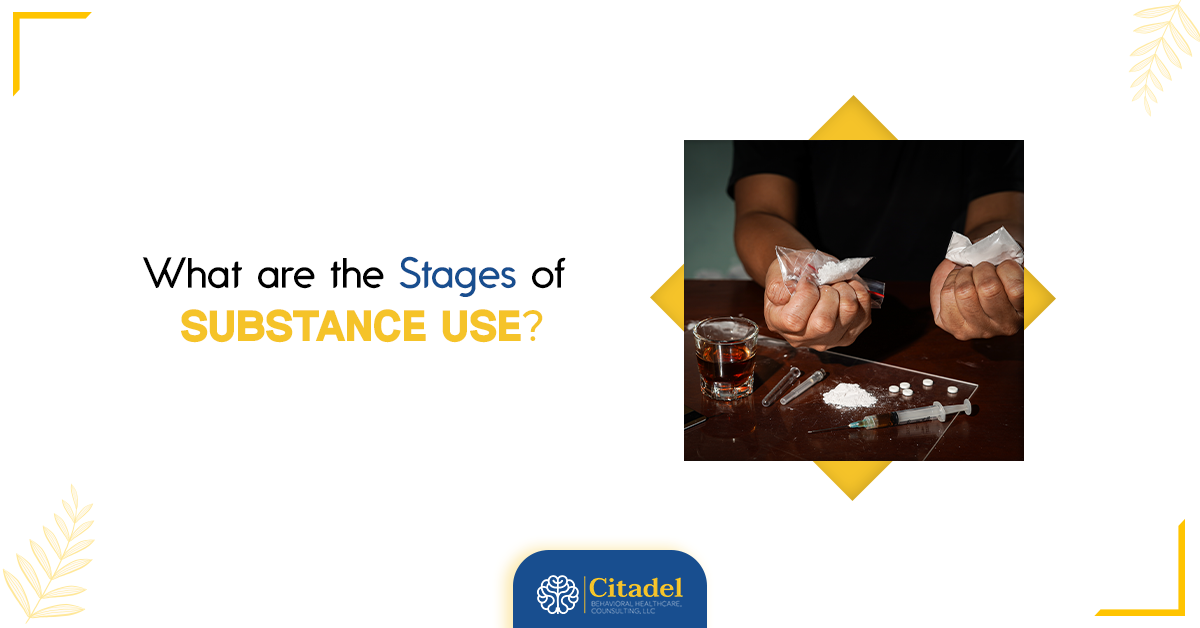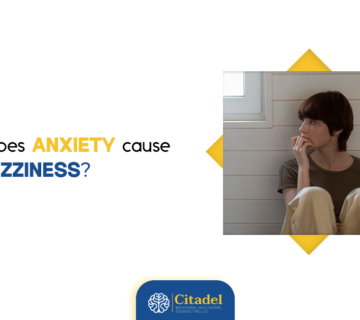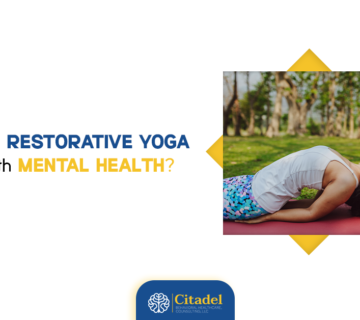Substance use is no overnight affair; it develops progressively. It often begins with casual use, gradually escalating to addiction’s grip. Learning about what are the stages of substance use? we gain insights. It reveals how addiction forms and how recovery takes shape. Breaking the cycle of addiction feels overwhelming. Change is possible.
Let’s discuss the 5 stages of addiction. We’ll walk you through each stage. You’ll see how people can go off track and, importantly, how they can get back on track. Ready to start?
At Citadel Behavioral Health Care, we help people overcome substance use issues. We help you recover with personalized care. Contact us today!
What is the Cycle of Addiction?
The cycle of addiction spins a web that’s hard to escape. It’s a repeating pattern of behaviors that entangles individuals, making quitting seem impossible. The first step of addiction seems innocent. But it lures you in. Over time, casual use can turn into a raging addiction. It can ruin every part of life.
The bright side? Knowing the phases of addiction empowers individuals and families. Break free and take control. Understanding brings freedom and healing.
-
Experimentation: Testing the Waters
Curiosity, peer pressure, or stress often trigger first-time substance use. Users think they’re in control, viewing it as a one-off act. However, this brief experiment can kick off a downward trend. Many believe they won’t continue, unaware of the impending risks.
Why People Experiment:
- Fitting in with friends or social groups becomes their desire.
- They are eager to discover the effects of the substance.
- A quick escape from feelings of stress, sadness, or boredom is what they seek.
The cycle of addiction often starts innocently. Casual use seems harmless, but it can be risky. Many try substances without issues. However, vulnerable people are at greater risk. Those with stress or family problems are especially likely to fall into addiction.
-
Regular Use: Building a Habit
After using a substance a few times, people might start using it regularly. This occurs when it becomes a weekly habit. For instance, someone might drink every weekend or use drugs to cope with stress.
Signs of Regular Use:
- Indulging in substances on certain occasions, such as post-work or during gatherings.
- Experiencing a mild urge to use the substance for relaxation or enjoyment.
- Establishing a regime based on the timing and method of substance use.
This point indicates that the habit is strengthening, facilitating a smoother move into the next step in the phases of addiction”
-
Risky Use: Ignoring the Warning Signs
Risky use happens when someone keeps using a substance despite its harm. For example, they might see harm to their health, relationships, or duties. Yet, they would continue anyway. It shows a cycle of awareness and denial. The substance’s appeal outweighs the warnings.
Signs of Risky Use:
- Not going to school or a job due to substance use.
- Arguing with loved ones because of their patterns.
- Engaging in risky behaviors, such as operating a vehicle after using substances.
At this point, risky habits show hidden challenges. The person might think they’re still in control, but addiction is starting to take hold.
-
Dependence: Losing Control
Dependence ensnares both body and mind. Soon, the person needs the substance to feel “normal.” This leads them deeper into addiction.
What Happens During Dependence:
- The individual experiences sickness or worry without the substance.
- They take more to feel the same.
- Concentration becomes a challenge, the next dose is all they can think about.
Dependence occurs when occasional use becomes a serious issue.
-
Addiction: Full Dependence
Addiction is the final stage in the 5 stages of addiction. Life becomes centered around the substance. Its pull dictates actions. Escaping it seems nearly impossible, even for those eager to be free.
Signs of Addiction:
- Using substances becomes its main focus.
- They sidestep or grow uninterested in enjoyment, jobs, or bonds.
- They might attempt to stop, but they experience intense longings and withdrawal reactions.
Addiction harms the user and their loved ones. It hurts both. It creates chaos in their lives. Knowing the stages of substance use helps. This knowledge helps you seek help before addiction takes hold.
Phases of Addiction Recovery: Steps to Healing
The good news? Recovery is achievable and worthwhile! Like addiction, recovery has stages. The phases of addiction recovery include steps that heal the body, mind, and spirit. Each stage is crucial for balance and lasting change. So, embrace this process toward wholeness.
Key Phases of Recovery:
- Realizing the Problem: Recovery starts with recognizing addiction. This step is crucial for healing. Without it, change is hard to achieve. So, acknowledging the problem is key to moving forward.
- Detoxification: As the body clears out substances, withdrawal symptoms can be tough. Yet, this process is vital for recovery. Healing starts with detoxification.
- Therapy and Treatment: Therapy finds the causes of addiction. It teaches coping skills without drugs. Rehab programs offer the tools to face challenges without relying on substances.
- Building a Healthy Life: After treatment, new habits can stop a relapse. An active lifestyle helps, too.
- Continuous Assistance: The path to recovery is lengthy. Support groups or therapy can help prevent a relapse into addiction.
Beating addiction isn’t swift. Still, every small piece of progress is important.
Why is Understanding the Stages of Substance Use Important?
Spot early signs by identifying substance use stages. This allows for quick action. For those struggling with addiction, understanding recovery stages offers hope and guidance. This insight is key to preventing and treating addiction. It lights the way forward.
Key Benefits of Learning About the Stages:
- Prevention: Awareness of hazardous conduct’s perils often halts progress to riskier activities.
- Early Help: Timely intervention by loved ones hinges on spotting red flags early. Vigilance prevents escalation.
- Support: We need to understand recovery’s journey to support it and help it heal.
Breaking the Cycle of Addiction: Tips for Prevention
Control addiction before it takes root; prevention is the ultimate prize. Consider these ingenious strategies:
- Learn and Educate: We must inform youth of the dangers of substance use.
- Build Healthy Coping Skills: Call attention to stress management techniques. This might be physical activities, interests, or discussing feelings with an expert.
- Use Positive Behaviors: Make activities with no substance use the routine.
- Intervene Early: If you see early signs of addiction, consult a doctor or a support group.
Let’s Conclude What Are the Stages of Substance Use?
Hope exists even in severe addiction. Understanding its five stages shows recovery paths. Each phase, from curiosity to dependence, needs different support. Knowledge helps loved ones guide them toward healing. Recovery may be tricky, but with care and understanding, change is possible. Every step is crucial in overcoming substance use.
Overcome addiction. Recovery is open to everyone. Just take the first step. It’s always the right time to get your life back. Together, we’ll create healthier, drug-free paths. It all starts now. Be open to change.
FAQs
What is the First Step of Addiction?
The first step is usually experimentation, where a person tries a substance out of curiosity or peer pressure. While it seems harmless, it can lead to further stages.
What is the Cycle of Addiction?
The cycle of addiction refers to the repeated pattern of substance use, withdrawal, and craving that makes it hard for someone to stop using drugs or alcohol.





No comment